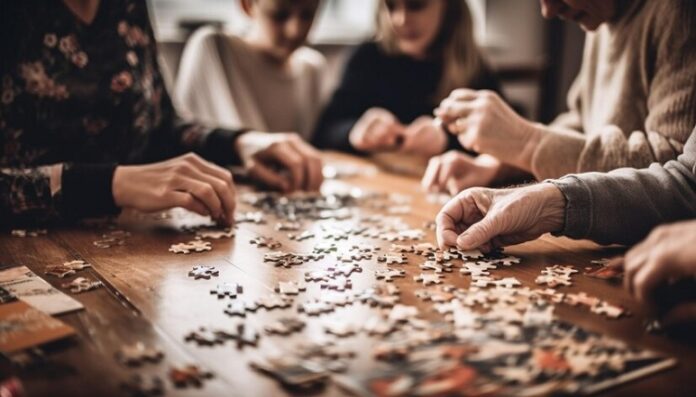You know that feeling when you’re part of a team that just clicks? When everyone’s on the same page, ideas flow freely, and you’re knocking out projects left and right? That’s the power of effective collaboration, folks.
In today’s fast-paced work world, being a team player isn’t just a nice-to-have – it’s an absolute must. Whether you’re working on a collaborative project at the office, tackling a group assignment in school, or spearheading a community initiative, strong collaboration skills can make all the difference.
Here’s the deal: developing effective collaboration skills is crucial for career success and can be achieved through a combination of self-awareness, emotional intelligence, clear communication, and active listening. By the end of this guide, you’ll have all the tools you need to become a collaboration powerhouse.
Key Takeaways
- Collaboration skills encompass personal qualities, teamwork abilities, and leadership traits that enable individuals to work effectively with others towards a common goal.
- Self-awareness, emotional intelligence, clear communication, active listening, goal setting, feedback, conflict resolution, and open-mindedness are essential components of effective collaboration.
- Improving collaboration skills can lead to increased productivity, better problem-solving, enhanced creativity, stronger team cohesion, and overall professional success.
Now, let’s dive into the juicy details of how to up your collaboration game!
Understanding Collaboration Skills
First things first, let’s define what we mean by “collaboration skills.” These are the skills that enable you to work effectively with others towards a shared goal. They encompass a wide range of abilities, including personal qualities like self-awareness and emotional intelligence, as well as teamwork skills like clear communication and active listening.
There are three main types of collaboration skills:
- Personal Skills: These are the intrinsic qualities that help you understand yourself and manage your emotions, like self-awareness and emotional intelligence.
- Teamwork Skills: These are the abilities that allow you to work harmoniously with others, such as clear communication, active listening, and conflict resolution.
- Leadership Skills: These are the traits that enable you to guide and motivate a team, like goal setting, delegation, and decision-making.
When you have a solid grasp of these collaboration skills, you’ll be a force to be reckoned with in any team setting. For example, imagine you’re working on a collaborative project with a tight deadline. Your self-awareness helps you identify your strengths and weaknesses, so you can focus on your strong suits while delegating tasks that play to your teammates’ strengths. Your emotional intelligence allows you to navigate any tensions or conflicts that arise with empathy and understanding. And your clear communication skills ensure that everyone is on the same page, working towards the same goals.
Building Self-Awareness
Self-awareness is the foundation of effective collaboration. When you have a deep understanding of your own strengths, weaknesses, values, and emotions, you’re better equipped to work harmoniously with others.
Here are some techniques to improve your self-awareness:
- Solicit Feedback: Ask your colleagues, friends, or mentors for honest feedback on your behavior, communication style, and work habits. This can provide valuable insights into how you’re perceived by others.
- Reflect on Past Projects: Think back on collaborative projects you’ve been involved in, both successful and unsuccessful. Analyze your role, your contributions, and areas where you could have improved.
- Work with a Mentor: Find a trusted mentor who can provide guidance and feedback on your personal and professional growth, including your self-awareness.
For example, let’s say you’re working on a team project, and you’ve noticed that you tend to get impatient when team members don’t meet deadlines. By reflecting on this behavior and soliciting feedback from your teammates, you might realize that your impatience comes across as frustration or even anger, which can negatively impact the team’s morale and productivity. With this self-awareness, you can work on managing your emotions and communicating more effectively.
Emotional Intelligence
Emotional intelligence (EQ) is the ability to recognize, understand, and manage your own emotions, as well as the emotions of those around you. It’s a crucial component of effective collaboration because it allows you to navigate interpersonal relationships with empathy and understanding.
Here are some techniques to improve your emotional intelligence:
- Practice Mindfulness: Engage in mindfulness practices like meditation or deep breathing exercises to increase your awareness of your emotions and how they impact your behavior.
- Recognize and Manage Emotions: Identify your emotional triggers and develop strategies to manage strong emotions in a healthy and productive way.
- Develop Empathy: Make an effort to understand others’ perspectives and emotions, even if they differ from your own.
Let’s say you’re working on a collaborative project, and one of your team members is consistently showing up late or missing deadlines. Instead of getting frustrated or angry, your emotional intelligence kicks in. You recognize that there might be underlying personal or professional issues causing this behavior, and you approach the situation with empathy and understanding. You have an open and non-judgmental conversation with your team member to understand their challenges and find a solution that works for everyone.
Clear Communication
Effective communication is the lifeblood of successful collaboration. When team members communicate clearly and openly, it fosters trust, aligned expectations, and a shared understanding of goals and responsibilities.
Here are some techniques to improve your communication skills:
- Active Listening: Practice active listening by giving your full attention to the speaker, maintaining eye contact, and avoiding distractions. Summarize what you’ve heard to ensure you’ve understood correctly.
- Clear Goal Setting: Work with your team to establish clear, specific, and measurable goals for the project or task at hand.
- Seek Feedback: Regularly ask for feedback from your team members to ensure that your communication is effective and that everyone is on the same page.
Let’s imagine you’re leading a cross-functional team working on a new product launch. Effective communication is essential to ensure that each department (marketing, sales, product development, etc.) is aligned and working towards the same objectives. By setting clear goals, actively listening to each team member’s input, and seeking feedback throughout the process, you can ensure that everyone is on the same page and that the launch goes smoothly.
Active Listening
Active listening is a critical component of effective communication and collaboration. When you actively listen, you’re fully present and engaged, focused on understanding the speaker’s message, and responding thoughtfully.
Here are some techniques to improve your active listening skills:
- Maintain Eye Contact: Maintain eye contact with the speaker to show that you’re focused and engaged in the conversation.
- Avoid Distractions: Minimize distractions by putting away your phone, closing unnecessary tabs or applications, and finding a quiet space for important conversations.
- Summarize: Periodically summarize what the speaker has said to ensure that you’ve understood correctly and to demonstrate that you’re actively listening.
For example, let’s say you’re in a team meeting discussing a new project proposal. Instead of formulating your response while your colleague is speaking, you practice active listening by maintaining eye contact, minimizing distractions (like checking your phone or email), and summarizing their main points to ensure you’ve understood correctly. This shows respect for your team member’s input and helps foster a collaborative environment where everyone feels heard and valued.
Goal Setting and Feedback
Setting clear goals and seeking feedback are essential for effective collaboration. When team members are aligned on the objectives and expectations, and there’s a culture of open and constructive feedback, it ensures that everyone is working towards the same end goal and continuously improving.
Here are some techniques to improve your goal setting and feedback skills:
- Establish SMART Goals: Work with your team to set Specific, Measurable, Achievable, Relevant, and Time-bound (SMART) goals for the project or task at hand.
- Solicit Feedback: Regularly ask for feedback from your team members on your work, communication style, and overall contributions to the team.
- Use Feedback to Improve: Openly accept feedback, even if it’s constructive criticism, and use it as an opportunity to identify areas for improvement and growth.
Let’s say you’re part of a team tasked with developing a new marketing campaign. By setting SMART goals, such as “Increase website traffic by 25% within the next three months,” everyone is aligned on the specific objectives and timeframes. Throughout the project, you actively solicit feedback from your team members on your contributions, ideas, and areas for improvement. This feedback loop ensures that the team is constantly iterating and improving, leading to a more effective and successful marketing campaign.
Conflict Resolution and Open-Mindedness
- Remain Calm: When conflicts arise, take a step back and approach the situation with a level head and a willingness to listen and understand all perspectives.
- Seek Common Ground: Focus on finding common ground and shared goals, rather than getting bogged down in disagreements or power struggles.
- Be Open to New Ideas: Approach new ideas or perspectives with an open mind, even if they differ from your own. Be willing to consider different approaches and pivot if necessary.
For example, let’s say you’re working on a collaborative project, and there’s a disagreement among team members about the best approach to take. Instead of getting defensive or shutting down alternate ideas, you remain calm and open-minded. You listen to each team member’s perspective, seek to find common ground (such as a shared goal of delivering a high-quality product), and consider new ideas or approaches that you may not have initially considered. This open and collaborative mindset can lead to more creative solutions and a stronger final product.
One of the best ways to illustrate conflict resolution and open-mindedness in action is by using a listing format:
- Identify the conflict or differing perspectives within the team.
- Encourage each team member to openly share their viewpoint and rationale.
- Listen actively to each perspective, without interrupting or dismissing ideas.
- Look for areas of common ground or shared goals that everyone can agree on.
- Brainstorm potential solutions or approaches that incorporate elements from different perspectives.
- Be willing to pivot or try a new approach if it aligns with the team’s common goals.
- Foster an environment of respect and open-mindedness, where all ideas are considered before making a final decision.
By following these steps, teams can navigate conflicts and differing perspectives in a constructive and collaborative manner, leading to stronger solutions and a more cohesive team dynamic.
Conclusion
Effective collaboration skills are essential for career success and can lead to increased productivity, better problem-solving, enhanced creativity, stronger team cohesion, and overall professional growth.
By developing these skills, you’ll become a collaboration powerhouse – the kind of team member that everyone wants to work with. You’ll be able to navigate team dynamics with ease, foster a collaborative environment, and contribute to projects in a meaningful and impactful way.
So, what are you waiting for? Start practicing these techniques today, and watch as your collaboration skills soar to new heights. Remember, collaboration isn’t just about working together – it’s about working together effectively, efficiently, and with a whole lot of awesomeness.







